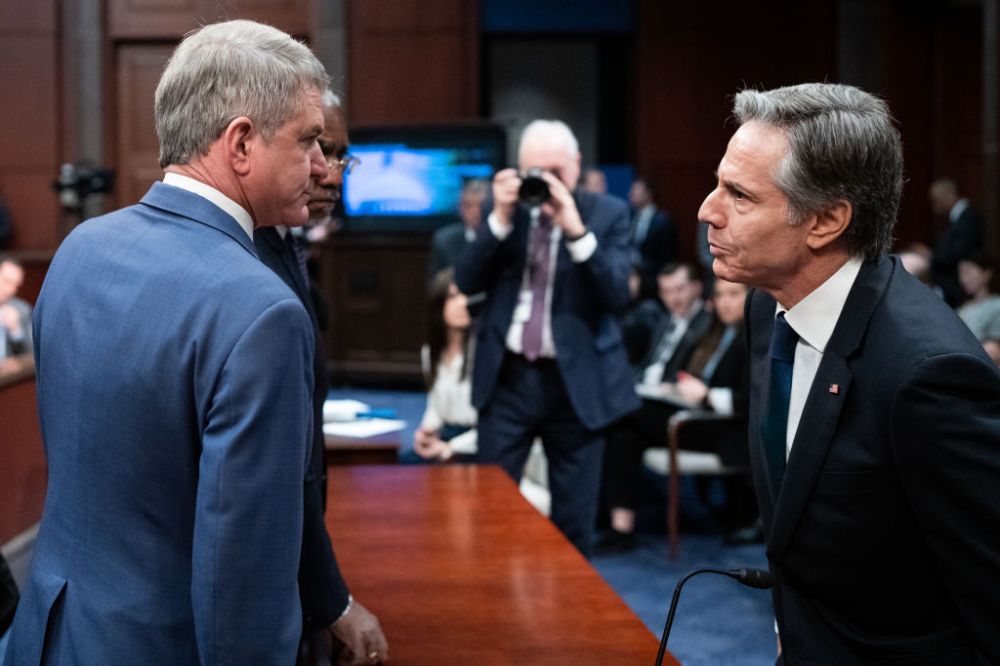House Foreign Affairs Committee Chairman Mike McCaul is threatening Secretary of State Antony Blinken with a subpoena early next week if Blinken does not provide key documents related to the Biden administration’s disastrous 2021 Afghanistan withdrawal.
During a committee hearing Thursday, McCaul set a close-of-business Monday deadline for Blinken to turn over an internal dissent cable more than 20 State Department officials sent in July 2021 warning of the potential collapse of Kabul if the withdrawal proceeded. It’s the firmest threat he’s made yet to use House Republicans' oversight powers after months of staff-level discussions with the State Department.
“This committee and the American people, after what happened—for God’s sake after what happened in that dreadful August—need to see this cable,” McCaul told Blinken on Thursday.
Blinken resisted the idea of delivering the full cable to lawmakers: He argued the State Department’s dissent channel allows anyone in the department to “speak truth to power,” and personnel have assurances such communications will remain confidential.
“It is vital to me that we preserve the integrity of that process and of that channel, that we not take any steps that could have a chilling effect on the willingness of others to come forward in the future to express dissenting views on the policies that are being pursued,” Blinken told the committee.
Rather than disclosing the whole document, Blinken said his staff is prepared “to make the relevant information in that cable available” in a briefing with lawmakers.
McCaul wasn’t satisfied with that argument. He cited remarks from former ambassador Thomas Boyatt, who in a written statement to the committee said it’s “bullshit” to claim oversight from Congress would have a chilling effect on the dissent channel.
“Congressional oversight enhances executive responsibility and enables us to learn from the inevitable mistakes,” Boyatt, the former ambassador to Colombia, wrote.
McCaul is also demanding the State Department hand over its already-written after-action report on the withdrawal. During the pullout, 13 American service members and at least 170 Afghans died in a terror attack, tens of thousands of Afghan allies who had been promised permanent legal residence in the United States were left behind, and 10 Afghan civilians were killed by a botched American strike officials wrongly believed was targeting a terrorist threat.
It’s not clear if the State Department will fully comply with McCaul’s dissent channel demand on time, although Blinken said his staff is working on producing other documents McCaul wants and will deliver its after-action report within three weeks.
McCaul held the first GOP-led Foreign Affairs Committee Afghanistan hearing earlier this month on the administration’s evacuation of Afghan allies and American citizens who had been in the country when it fell to the Taliban. The next hearing on the withdrawal isn’t expected until after lawmakers return from an April recess.
Expert Urges Sanctions on Xi Jinping
German researcher Adrian Zenz told lawmakers on Thursday night to pursue direct sanctions against Chinese leader Xi Jinping in response to the genocide of Uyghurs and other ethnic Muslim groups in Xinjiang.
It’s a move most lawmakers and administration officials haven’t seriously contemplated, even after the United States government officially designated the Chinese government’s human rights abuses in Xinjiang a genocide in early 2021. Only a handful of world leaders face direct American sanctions, Russian President Vladimir Putin joining their ranks last year after he launched his unprovoked war against Ukraine.
Zenz’s comments came during the second hearing of the new House select committee on competition with the Chinese Communist Party.
Sanctions on Xi would likely cause a diplomatic uproar: One bill targeting Xi with sanctions last year provoked a tirade from the Chinese embassy, calling the legislation “arrogant and despicable.”
In his testimony, Zenz pointed to leaked speeches in which Xi showed a “close interest and guiding role” in the governance of Xinjiang. Zenz included a list of more than a dozen other top Chinese officials he believes should also be sanctioned for their roles in the genocide.
“So far, the U.S. has not sanctioned a single central government official even though they are implicated,” Zenz told the panel.
Uyghurs, Kazakhs, Kyrgyz, and other ethnic groups in Xinjiang have faced mass detention, torture, sterilization, forced abortions, and forced labor at the hands of Chinese officials in recent years. You can read Zenz’s full written testimony here.
Most members of Congress are likely hesitant to rally around Zenz’s sanctions recommendation, but some are willing to endorse it.
“We just had the guy travel to Russia to provide economic assurances that Russia can continue to murder, rape Ukrainians,” Sen. Thom Tillis, a North Carolina Republican, told The Dispatch of Xi on Thursday. “That’s who this guy is. And then he goes back to his country, where he has a million Uyghurs effectively in prison. Yeah, I think it makes sense.”
Senators Tackle Transnational Repression
Earlier this year, we wrote to you about Sen. Jeff Merkley’s push for a separate FBI tip line dedicated to reports of transnational repression—foreign authoritarian governments’ attempts to oppress diaspora communities living around the world. Merkley introduced a bill on the issue last week, alongside Sens. Marco Rubio, Ben Cardin, and Bill Hagerty.
The topic will have staying power in this Congress: A companion bill in the House will likely come, and some lawmakers on the House’s select committee on competition with China have also expressed interest in addressing the problem, including how it affects international students in America.
The Chinese government is one of the foremost perpetrators of transnational repression, engaging in intimidation, spying, and threats against Chinese nationals and dissidents who live in America and other countries. Other governments, including Russia, Iran, and Belarus, have engaged in similar human rights abuses and repressive tactics.
“It’s terrible when authoritarian regimes oppress their people at home, but it’s an unacceptable act of aggression to target dissidents in other countries,” Merkley said when the bill was introduced. “The U.S. must take a stand and pursue a whole-of-government approach to address the rising tide of transnational repression whenever and wherever it occurs.”
The legislation, titled the Transnational Repression Policy Act, would establish a tip line managed by the departments of Justice and Homeland Security for transnational repression reporting. The line would be manned by personnel familiar with at-risk communities and the languages they speak, and it would have to be safely encrypted to protect callers from retaliation. The bill also mandates that the departments conduct public outreach to inform communities about the tip line and what kind of activities should be reported.
The measure also calls for a number of reports to expand the American government’s knowledge of the issue, including a specific section in the State Department’s annual human rights report. The reporting would focus both on governments that engage in transnational repression and governments that enable it—such as Middle Eastern countries cooperating with China’s extradition requests for Uyghurs who have fled Xinjiang.
One section of the bill provides an interesting glimpse into where Congress may turn next: It mandates a report from the administration within 270 days of enactment detailing the government’s strategy to address transnational repression. That report will have to consider the implications of potential changes to U.S. law criminalizing “the gathering of information about private individuals in diaspora and exile communities on behalf of a foreign power that is intending to harass, intimidate, or harm an individual in order to prevent their exercise of internationally-recognized human rights.”
Senators also want to see more extensive training for American diplomats and other federal employees on recognizing and responding to transnational repression. The bill authorizes $1 million per year from fiscal year 2024 through fiscal year 2027 for developing such curricula—but authorizations aren’t the same as appropriations, and the money would have to be included in separate government spending bills for it to have force.






Please note that we at The Dispatch hold ourselves, our work, and our commenters to a higher standard than other places on the internet. We welcome comments that foster genuine debate or discussion—including comments critical of us or our work—but responses that include ad hominem attacks on fellow Dispatch members or are intended to stoke fear and anger may be moderated.
With your membership, you only have the ability to comment on The Morning Dispatch articles. Consider upgrading to join the conversation everywhere.